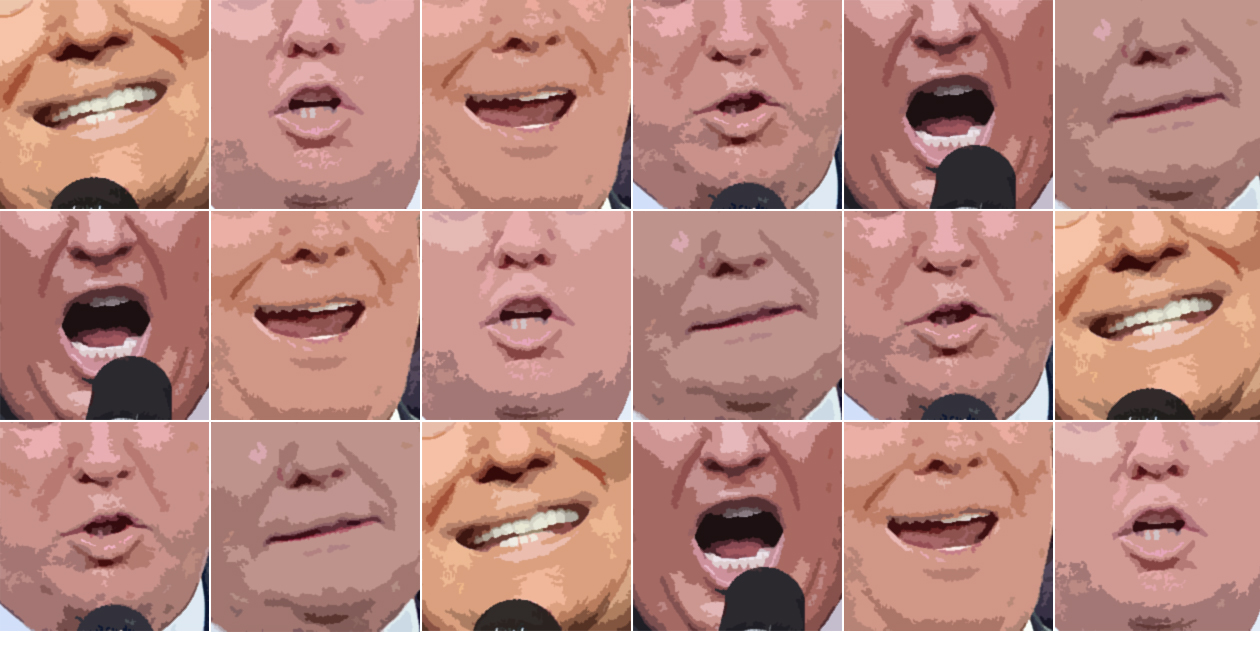Donald Trump is losing his war on political correctness
This is why we can't say un-nice things


"I'm so tired of this politically correct crap," Donald Trump declared back in September 2015 to big cheers from a campaign crowd in South Carolina. That line, or a similar knock on "political correctness," has become a staple at his rallies, and it's always a hit. Like so much of the 2016 race, this election has been about relitigating the battles of the 1990s, and Trump's war on political correctness is as much of a throwback to the Bill Clinton presidency as Hillary Clinton's quip about how she "could have stayed home and baked cookies and had teas," or Trump's bankruptcies.
Like hipsterism, the term "political correctness" is not embraced by the people said to practice it, but rather a phrase wielded as a cudgel by those who oppose the idea. And raging against PC culture — an unfortunate abbreviation in the 1990s, when PCs were also "not Macs" — is one of Donald Trump's most underrated allures.
Or at least it was. Trump has embraced his anti-PC crusade a little too tightly, and it's killing his campaign, and his cause.
The Week
Escape your echo chamber. Get the facts behind the news, plus analysis from multiple perspectives.

Sign up for The Week's Free Newsletters
From our morning news briefing to a weekly Good News Newsletter, get the best of The Week delivered directly to your inbox.
From our morning news briefing to a weekly Good News Newsletter, get the best of The Week delivered directly to your inbox.
When political correctness entered the general lexicon in the early 1990s, it was a conservative response to what critics like Dinesh D'Souza (who, yes, just released an anti-Hillary movie) viewed as a stifling liberal orthodoxy and push for multiculturalism in academia. By the spring of 1991, the term had jumped the ivory tower.
"What has come to be called 'political correctness,' a term that began to gain currency at the start of the academic year last fall, has spread in recent months and has become the focus of an angry national debate, mainly on campuses, but also in the larger arenas of American life," Robert McFadden wrote in The New York Times in May 1991. He defined the goals of political correctness as "more diverse curriculums, affirmative action, and the suppression of racial hatreds, among others," and noted that critics accuse PC culture of "a widespread tendency to use censorship, intimidation, and other weapons abhorrent to the American political process to support popular demands for measures to enforce sexual, racial, and ethnic equality."
When McFadden wrote that, President George H.W. Bush had just lambasted PC culture in a commencement speech at the University of Michigan:
"The notion of political correctness has ignited controversy across the land. And although the movement arises from the laudable desire to sweep away the debris of racism and sexism and hatred, it replaces old prejudice with new ones. It declares certain topics off limits, certain expression off limits, even certain gestures off limits. What began as a crusade for civility has soured into a cause of conflict and even censorship ... Throughout history, attempts to micromanage casual conversation have only incited distrust. They have invited people to look for an insult in every word, gesture, action. And in their own Orwellian way, crusades that demand correct behavior crush diversity in the name of diversity." [George H.W. Bush, University of Michigan]
That's essentially the case Donald Trump is trying to make today, though without all the highbrow language. (Bush also said a few paragraphs later that "political extremists roam the land, abusing the privilege of free speech, setting citizens against one another on the basis of their class or race," and that "such bullying is outrageous.") When explained as Bush did, who wouldn't oppose Orwellian conversation micromanagement?
A free daily email with the biggest news stories of the day – and the best features from TheWeek.com
Today, academia has long moved on from tilting at political incorrectness to fighting "hate speech," but in the broader culture, the anti-PC crusade still has appeal. And not just among conservatives, either. Comedians deplore PC culture, and libertarian-leaning Trump hater Bill Maher even named his show Politically Incorrect. Nobody likes to be told they can't say certain things, or speak their mind.
After Trump either encouraged his supporters to assassinate Clinton on Tuesday, or tried to rally the NRA vote to defeat her at the polls — take your pick — conservative writer Martin Walsh expressed his anger that the media wasn't focusing more on the presence of Orlando nightclub killer Omar Mateen's father at a Clinton rally in Florida. "Too bad we can't post what we really feel," somebody commented back.
But Trump's "ambiguous wink wink to 'Second Amendment people,'" as New York Times columnist Thomas Friedman puts it, shows not only the limits of Trump's anti-PC campaign, but actually serves as a kind of defense of political correctness. What conservative critics call political correctness, liberals and moderates might call good manners or civil discourse.
When Trump rails against political correctness, or proves his anti-PC bona fides by calling Mexicans "rapists" or female critics ugly or hormonal, he's giving "America's self-proclaimed 'silent majority' license to speak their mind," says Vanity Fair. "Many Americans have reacted with horror to Trump's boorish pronouncements," but for many of his supporters, "being able to openly disparage groups they disagree with or dislike is precisely the point."
This worked well for Trump in the Republican primary campaign, where he was able not only to harness the anger at social elites and their Miss Manners lexicological finger-wagging, but also tether it to the feckless political elites he was running to crush. It might have worked in the general election, too, but Trump seems to have gotten inebriated on his own Kool-Aid and decided that he can say anything he wants, anything he feels, and get rewarded for his anti-PC bravery.
Trump really started losing Republican support right after he clinched the nomination, when he went after a Mexican-American judge overseeing the Trump University lawsuit, then started his current nosedive in the polls when he reacted peevishly to criticism from the parents of a Muslim-American solider who died in Iraq while saving fellow service members. Things have only gone downhill since then, and Trump's plausibly misinterpreted call to violence against Clinton is one logical conclusion.
Jason P. Steed, an English professor turned appellate lawyer, took to Twitter on Tuesday to deconstruct Trump's "just kidding" shtick — he wrote his PhD dissertation on the social function of humor, he explained in the first of 23 tweets. The social function of humor is to form "in" and "out" groups, he wrote, where the in-group accepts the premise of the joke (i.e. that one group of people is stupid or sexually predatory) and the out-group is fed the dishonest "just kidding" line.
Interestingly, in the 1994 book The War of the Words: The Political Correctness Debate, Stuart Hall traces the origins of the phrase's modern usage to a 1970s "in-joke on the left" about Communist Party strictures. In 2016, lost in translation, it is certainly possible that "PC culture," like many social revolutions, has gone too far. Maybe we all run to the fainting couch a little too quickly.
But if I were leading a crusade to make it acceptable to say terrible things about entire groups of people, or specific women and minorities who irritated me, without social or political repercussions, I'd probably choose my words carefully. If Donald Trump is choosing his words carefully, he is doing a disservice to his supporters still incensed, after 25 years, at the crushing elitist oppression of political correctness.
Most likely, he's just being Donald Trump The Candidate, who likes to provoke and goad and see his name in the media. And after a year of ever-more outrageous statements, he may have emboldened a nation of aggrieved tongue-holders to bravely be politically incorrect, but he has also proved that America has essentially accepted the premise that there are taunts and slurs that are outside the bounds of political and social discourse.
Peter has worked as a news and culture writer and editor at The Week since the site's launch in 2008. He covers politics, world affairs, religion and cultural currents. His journalism career began as a copy editor at a financial newswire and has included editorial positions at The New York Times Magazine, Facts on File, and Oregon State University.
-
 Quiz of The Week: 10 – 16 January
Quiz of The Week: 10 – 16 JanuaryQuiz Have you been paying attention to The Week’s news?
-
 Woman in Mind: a ‘triumphant’ revival of Alan Ayckbourn’s dark comedy
Woman in Mind: a ‘triumphant’ revival of Alan Ayckbourn’s dark comedyThe Week Recommends Sheridan Smith and Romesh Ranganathan dazzle in ‘bitterly funny farce’
-
 The Week Unwrapped: Will Uganda’s pop-star politician prevail?
The Week Unwrapped: Will Uganda’s pop-star politician prevail?Podcast Plus, is dodgy data undermining medical research? And what does a new app reveal about Chinese society?
-
 The billionaires’ wealth tax: a catastrophe for California?
The billionaires’ wealth tax: a catastrophe for California?Talking Point Peter Thiel and Larry Page preparing to change state residency
-
 Bari Weiss’ ‘60 Minutes’ scandal is about more than one report
Bari Weiss’ ‘60 Minutes’ scandal is about more than one reportIN THE SPOTLIGHT By blocking an approved segment on a controversial prison holding US deportees in El Salvador, the editor-in-chief of CBS News has become the main story
-
 Has Zohran Mamdani shown the Democrats how to win again?
Has Zohran Mamdani shown the Democrats how to win again?Today’s Big Question New York City mayoral election touted as victory for left-wing populists but moderate centrist wins elsewhere present more complex path for Democratic Party
-
 Millions turn out for anti-Trump ‘No Kings’ rallies
Millions turn out for anti-Trump ‘No Kings’ ralliesSpeed Read An estimated 7 million people participated, 2 million more than at the first ‘No Kings’ protest in June
-
 Ghislaine Maxwell: angling for a Trump pardon
Ghislaine Maxwell: angling for a Trump pardonTalking Point Convicted sex trafficker's testimony could shed new light on president's links to Jeffrey Epstein
-
 The last words and final moments of 40 presidents
The last words and final moments of 40 presidentsThe Explainer Some are eloquent quotes worthy of the holders of the highest office in the nation, and others... aren't
-
 The JFK files: the truth at last?
The JFK files: the truth at last?In The Spotlight More than 64,000 previously classified documents relating the 1963 assassination of John F. Kennedy have been released by the Trump administration
-
 'Seriously, not literally': how should the world take Donald Trump?
'Seriously, not literally': how should the world take Donald Trump?Today's big question White House rhetoric and reality look likely to become increasingly blurred
